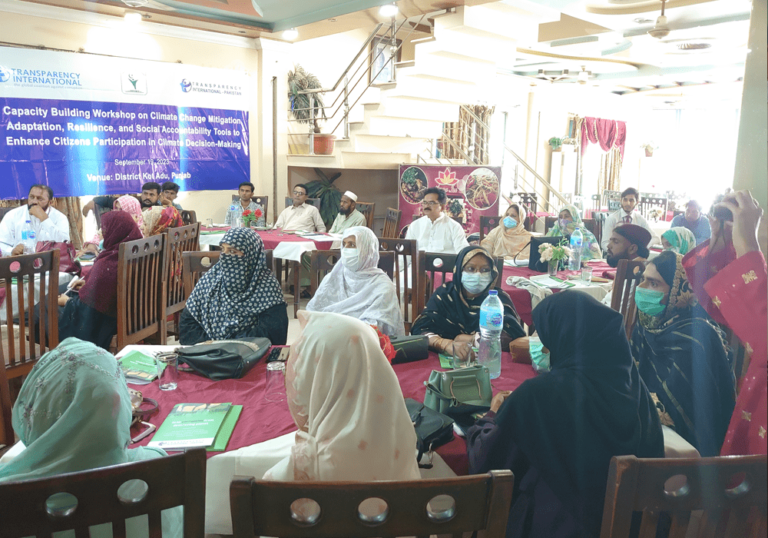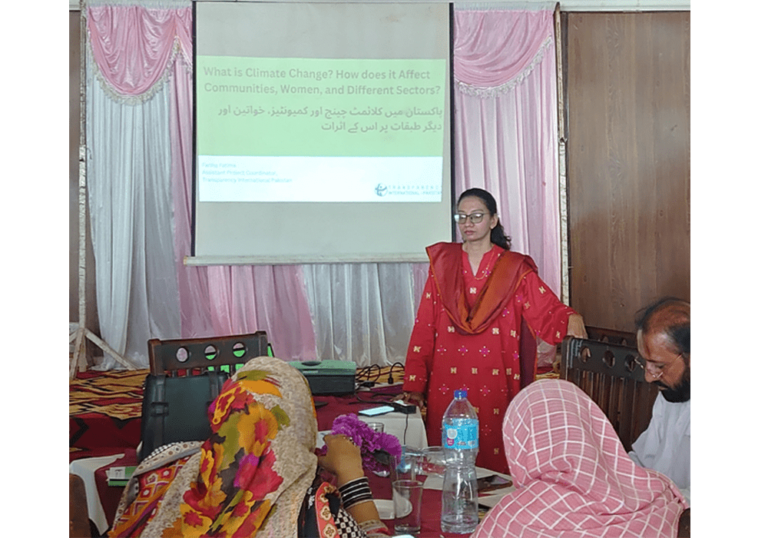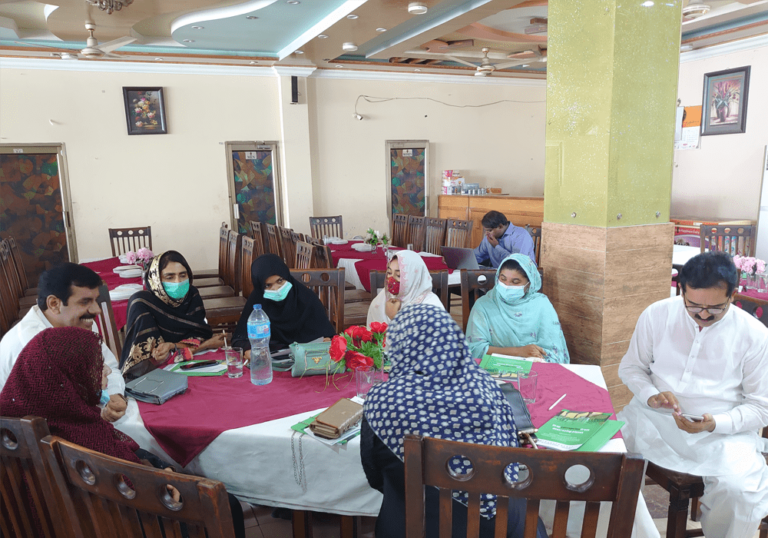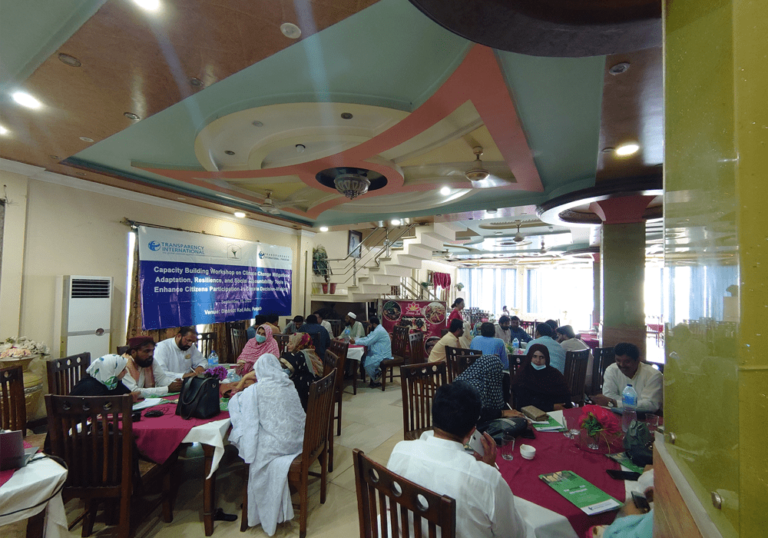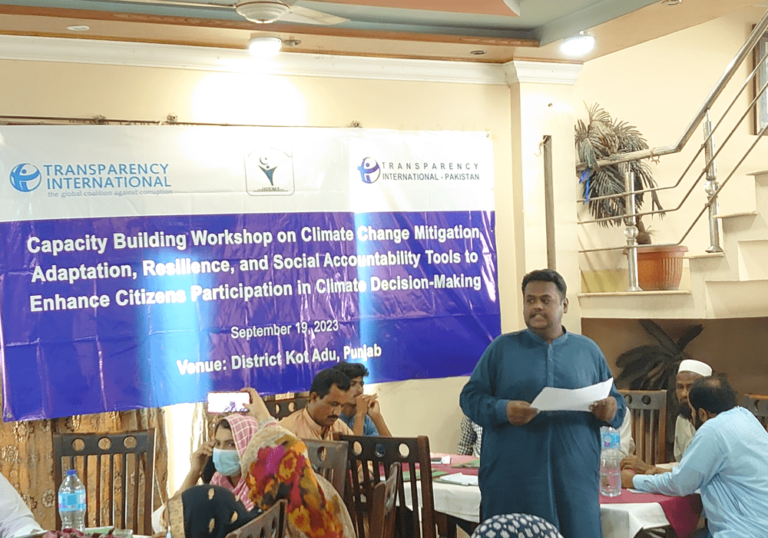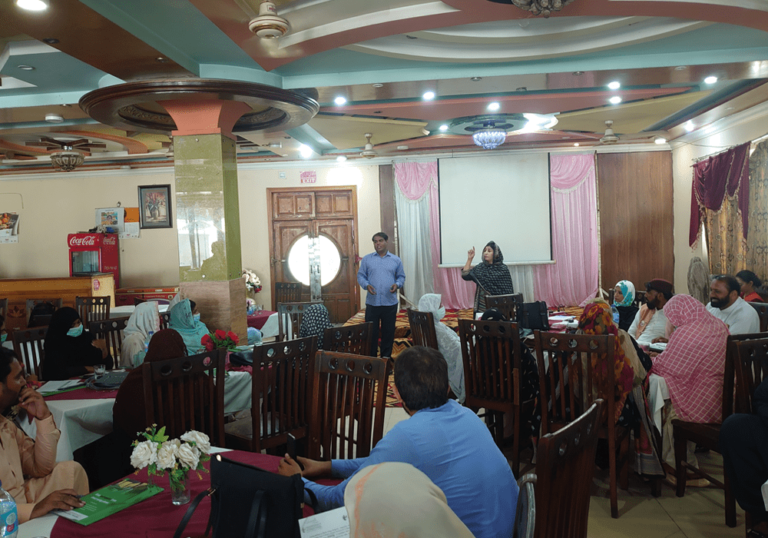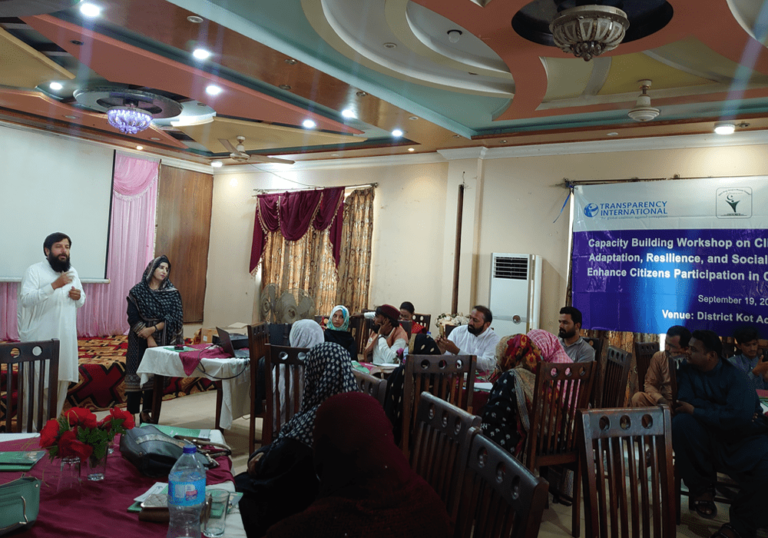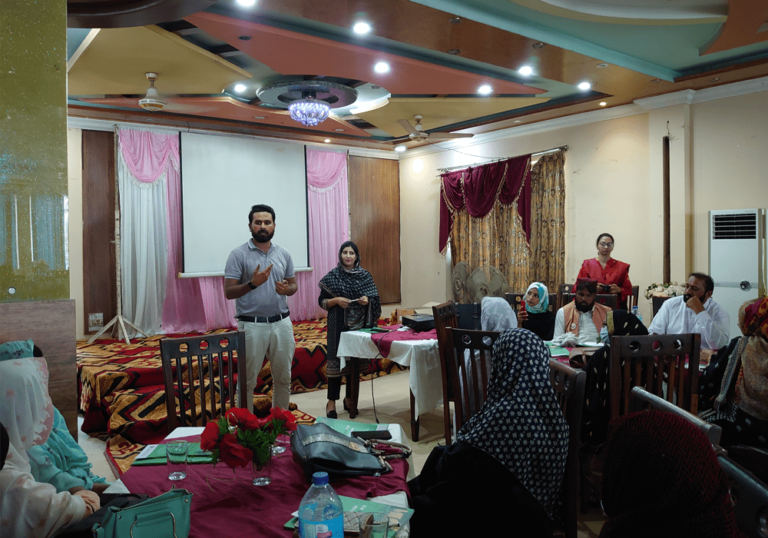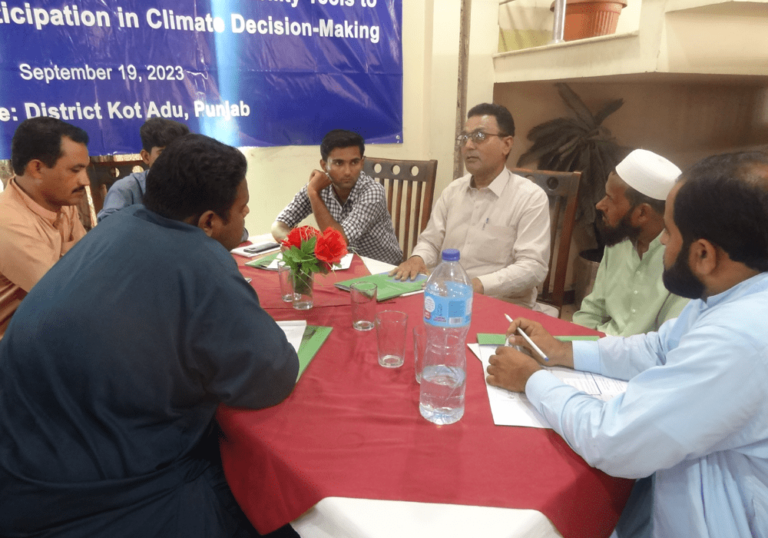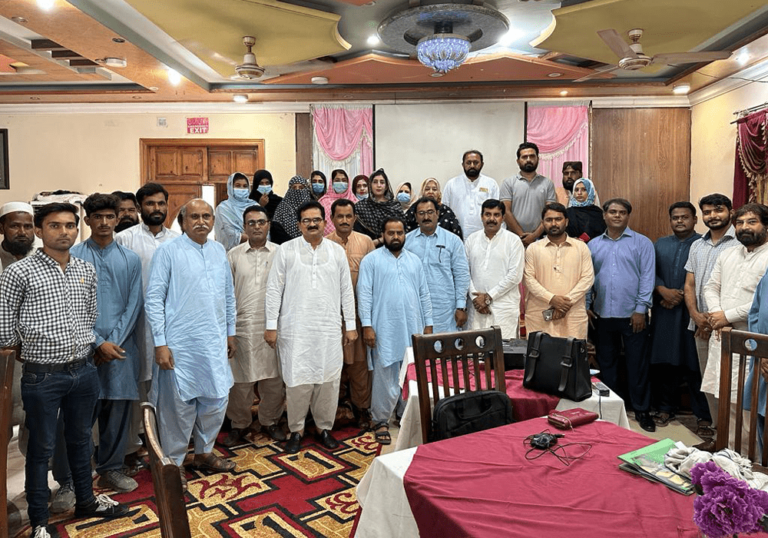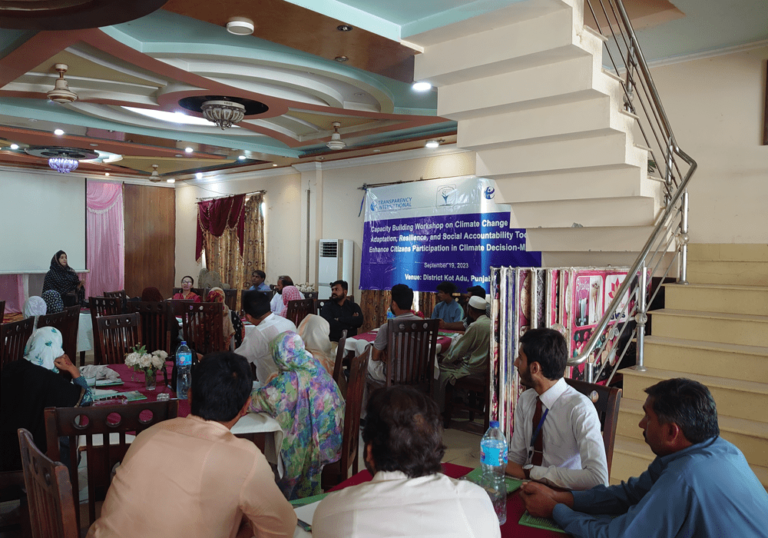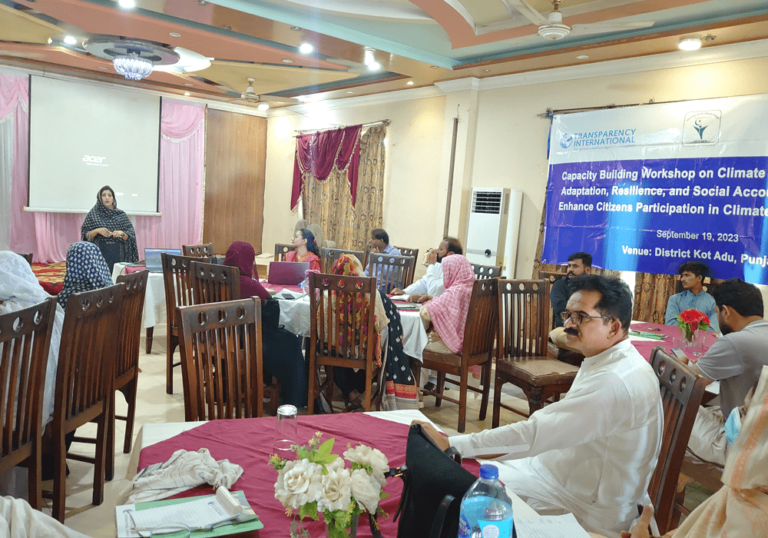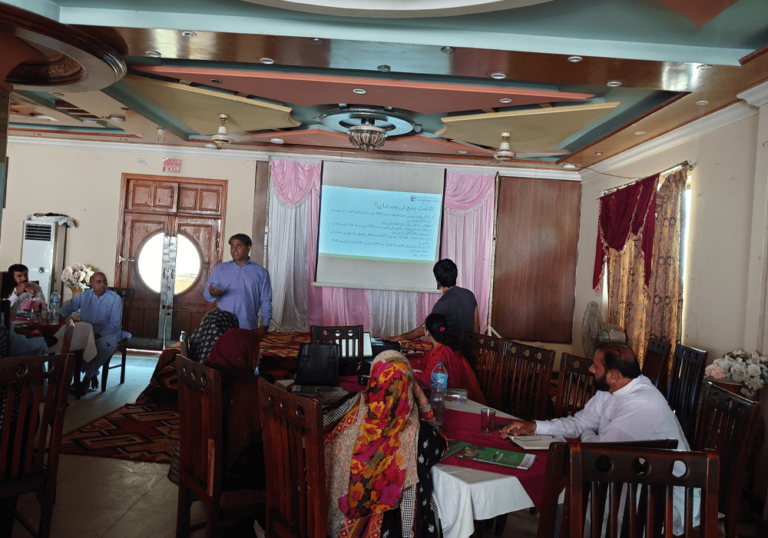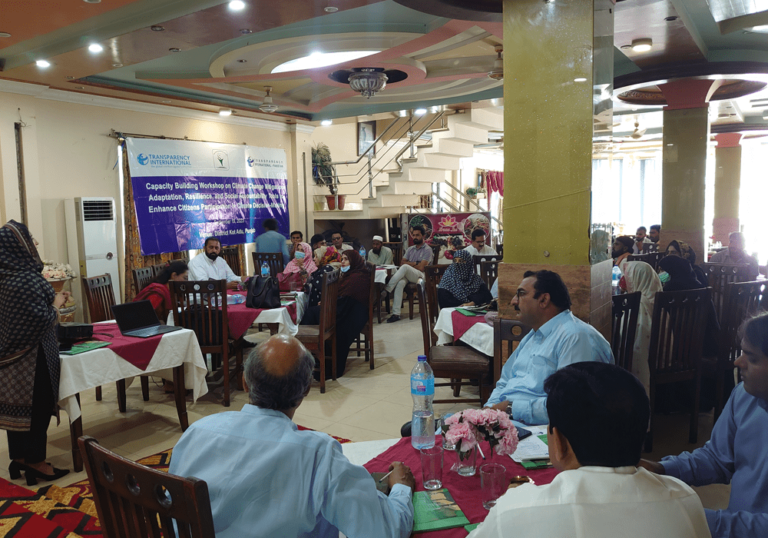- Home
- Training Workshop on Climate Change Mitigation, Adaptation, Resilience, and Social Accountability Tools to Enhance Citizens Participation in Climate Decision-Making
Training Workshop on Climate Change Mitigation, Adaptation, Resilience, and Social Accountability Tools to Enhance Citizens Participation in Climate Decision-Making
Training Workshop on Climate Change Mitigation, Adaptation, Resilience, and Social Accountability Tools to Enhance Citizens Participation in Climate Decision-Making
Venue: District Kot Addu, Punjab
Date: 19 September, 2023
Transparency International Pakistan organized a Training Workshop on Climate Change Mitigation, Adaptation, Resilience, and Social Accountability Tools to Enhance Citizens Participation in Climate Decision-Making in District Kot Addu, Punjab. The workshop was attended by Local Community Members, Youth, Civil Society Representatives, Representatives of District Social Welfare Department, District Disaster Management Authority, Climate Change Experts and Journalists.
The main objective of the training workshop was to educate the communities on Climate Change Mitigation, Adaptation, Resilience, and Social Accountability Tools to Enhance Citizens Participation in Climate Decision-Making and empower them with the skills to identify and report environmental corruption.
The event started with the recitation of the Holy Quran after which a round of introduction was held. Dr. Shagufta Khan, President – Idara Baraye Samaji-o-Moashi Taraqi (IBSMT) and Mr. Toufique Wassan, Project Coordinator – Transparency International Pakistan welcomed the participants and shared the objectives of training workshop.
Mr. Toufique Wassan, Project Coordinator, TI Pakistan gave an overview of the Climate Governance Integrity Programme. He briefly explained the situation of climate change in Pakistan and Punjab, and the policy gaps to ensure the resilience and adaptation.
Afterwards Ms. Fariha Fatima, Assistant Project Coordinator, TI Pakistan conducted the session on impacts of climate change on communities, women, and different sectors. She said that increased intensity of floods, droughts and heat waves are the direct outcomes of climate change and it is also making the national food security vulnerable. In 2022, Punjab experienced torrential rains and severe floods damaging over 438,000 acres of crops/orchards, 733,000 livestock and up to 50% of water systems.
She said that in disasters, local communities face issues like displacement from their native place to relief camps where they do not have minimum facilities to survive with their children and family. With the global increase in average temperatures and shifting weather patterns due to Climate Change, Punjab is most likely going to face extremely hot and long summers which will increase the chances of droughts in many districts along with heat waves and decrease in crops which can lead to food security threats.
She also shared the effects of climate change on women and other vulnerable communities. She explained how climate change and corruption hit women differently than men. Women suffer with harassment and domestic violence during and after disasters. They do not have access to clean water, safe toilets, medical facilities, and education during the disasters. Malnutrition and lack of psychological support also effect women badly.
Moving on, Community Resilience Building exercise was also conducted during the session. The participants were divided into different groups and were asked to identify the vulnerabilities in three key areas infrastructure, environment and social. Given these three areas, they were also asked to prioritize the risk of different hazards such as heatwaves, floods, and droughts. The participants highlighted different risks in Kot Addu and also suggested some measures to mitigate these risks.
Group 1 & 2 assigned to infrastructural vulnerabilities, highlighted the issues of unplanned constructions of housing schemes which lead to deforestation and use of agriculture land. Other highlighted issues included: a) construction of factories which cause more greenhouses gases emissions and air pollution, b) changes in weather patterns and unusual rain which damage the harvested crops and lead to issues of food insecurity, c) destruction of road network and schools during disasters which delay the rehabilitation of the communities, d) increasing use of air conditioners which causes weather warming, and e) unawareness towards the climate change and its effects among the local people. The group suggested policy reforms for construction sector, tree plantation and awareness of climate issues in the area.
Group 3 & 4 highlighted the environmental vulnerabilities including: a) deforestation for housing and farming, b) heatwaves that disturb the farming season, c) decrease in crops production, d) dumping of industrial waste into water bodies, and e) water pollution, air pollution and smog. This group suggested adaptation measures such as use of renewable energy, proper sewage system, protection of eco system, tree plantation and behavior changes to tackle the effects of climate change.
Group 5 & 6 highlighted the societal vulnerabilities including a) increase in population, b) lack of awareness about protection of environment, and c) lack of cleanliness which causes air pollution. This group suggested quality education as a mitigation measure, and proposed adding climate education in syllabus.
Moving on, Mr. Yousuf Jamal, Focal Person, District Disaster Management Authority (DDMA) shared his valuable insights on climate mitigation, adaptation & resilience and adaptable living. He discussed the work of DDMA during disasters and in general, and highlighted the challenges while working for rescue and rehabilitation. He informed that DDMA is the platform which can be used for public consultations to improve governance and to ensure communities participation in decision making process.
He highlighted that mitigation helps to address the cause of the problem. He explained adaptation which refers to making changes to human and natural systems to respond to the future impacts of climate change. Adaptation attempts to address the effects of the problem. He also shared changes in life practices and tips for adaptable living.
Afterwards, Mr. Toufique Wassan, Project Coordinator, TI Pakistan conducted a session on social accountability and citizen engagement in climate planning and decision making. He gave a detailed presentation on social accountability tools including open budgeting, budget tracking and monitoring, public hearings and consultations.
He explained The Punjab Transparency and Right to Information Act 2013 to the participants and shared that this act can be a useful tool in ensuring transparency in policy and project implementation. He explained the jurisdiction of Punjab Information Commissions and how to use this act for acquiring information about utilization of funds, planning of development of schemes and execution status.
Applicants were taught to write an RTI application to the different relevant departments. Participants were told that they can use this act as social accountability tool to play their part in promoting accountable and transparent governance structures.
Towards the end, a group exercise was held where participants practiced writing RTI applications to the relevant departments. The participants expressed their gratitude to TI Pakistan for arranging training workshop and committed to apply the learnings to mitigate the effects of climate change.


